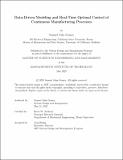| dc.contributor.advisor | Anthony, Brian W. | |
| dc.contributor.author | Gomez, Samuel John | |
| dc.date.accessioned | 2025-08-27T14:32:22Z | |
| dc.date.available | 2025-08-27T14:32:22Z | |
| dc.date.issued | 2025-05 | |
| dc.date.submitted | 2025-06-20T18:51:23.056Z | |
| dc.identifier.uri | https://hdl.handle.net/1721.1/162543 | |
| dc.description.abstract | When faced with complex disturbances, continuous manufacturing processes require robust control and adaptability to maintain product quality and operational efficiency. Although advanced control strategies such as linear quadratic regulator, model predictive control, and adaptive control have demonstrated strong performance, many industrial processes still rely predominantly on classical proportional-integral-derivative (PID) controllers because of their simplicity, ease of implementation, and sufficient results.
This thesis investigates the effectiveness of data-driven modeling techniques in capturing system dynamics more accurately than traditional physics-based models. It further examines using a high-fidelity digital twin, constructed from experimental data via linear system identification and nonlinear deep learning (NARX) approaches, to optimize PID controller parameters through simulation-based gradient descent methods.
A comprehensive experimental platform was developed to collect synchronized sensor and video data from a roll-to-roll continuous manufacturing system, specifically targeting disturbance scenarios that cause process interruptions. The digital twin created from these data was validated against physical experiments and shown to outperform conventional physics-based models when predicting the system’s dynamic response to disturbance inputs.
Optimal control of the system was explored by implementing a virtual PID controller that closely replicates the physical controller. Optimal gain settings were identified through simulation and applied to the physical manufacturing process. The experimental results showed a significant reduction in the mean squared error and the maximum web deviation. These results demonstrate the substantial potential of digital twin-driven, data-centric control approaches in enhancing resilience, efficiency, and adaptability in manufacturing processes. This research also lays the foundation for the future development of real-time, adaptive, and autonomous control strategies in industrial applications. | |
| dc.publisher | Massachusetts Institute of Technology | |
| dc.rights | In Copyright - Educational Use Permitted | |
| dc.rights | Copyright retained by author(s) | |
| dc.rights.uri | https://rightsstatements.org/page/InC-EDU/1.0/ | |
| dc.title | Data-Driven Modeling and Real-Time Optimal Control of Continuous Manufacturing Processes | |
| dc.type | Thesis | |
| dc.description.degree | S.M. | |
| dc.contributor.department | System Design and Management Program. | |
| dc.identifier.orcid | https://orcid.org/0009-0001-1267-0496 | |
| mit.thesis.degree | Master | |
| thesis.degree.name | Master of Science in Engineering and Management | |
